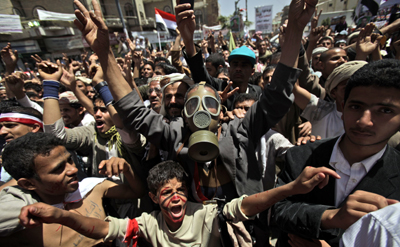New York, March 22, 2011–Plainclothes gunmen raided Al-Jazeera’s Sana’a bureau early this morning, confiscating equipment and obstructing operations, the Qatar-based news channel reported today as a drumbeat of anti-press attacks continued in the region. Arrests, attacks, and harassment were also reported in Libya, Syria and Bahrain in recent days.
Al-Jazeera said around 20 armed men, their faces obscured by head scarves, forcibly entered the Sana’a offices before dawn. The station said some gunmen remained on the roof of the building housing the bureau late today, obstructing Al-Jazeera’s local operations. The gunmen’s identities were unclear, although Al-Jazeera said uniformed police witnessed the raid and did not intervene.
The raid follows the expulsion of Al-Jazeera correspondents Ahmad Zeidan and Abdel Haq Sadah on Saturday. The previous week, Yemen expelled six other international journalists in an effort to restrict coverage of the revolt and the government’s violent response. The Yemeni Journalists’ Syndicate has documented more than 50 separate attacks on journalists since the beginning of social unrest in Yemen in January, including a killing, abductions, dozens of physical assaults, confiscation of equipment, and scores of death threats against journalists and their families.
“Yemeni authorities must stop treating media as if they were the cause of the country’s unrest,” said Mohamed Abdel Dayem, Middle East and North Africa program coordinator for the Committee to Protect Journalists. “Every time the state, in Yemen and elsewhere in the region, has attacked journalists or media installations, it has further inflamed public opinion.”
Attacks on the press were reported elsewhere in the region.
In Libya, Agence France-Presse journalists Dave Clark and Roberto Schmidt and Getty Images photographer Joe Raedle, who had been missing since Friday, are now confirmed to be in government custody, AFP said. According to an individual who was travelling with them, the three journalists were detained about seven miles outside the eastern city of Ajdabiya on Saturday.
The Libyan government now holds at least seven journalists in custody. Al-Jazeera correspondents Ahmed Vall Ould Addin and Lotfi al-Messaoudi, and cameramen Kamel Atalua and Ammar al-Hamdan are also reported in custody. At least six local journalists who had been critical of Qaddafi remain missing amid wide speculation they, too, may be in government custody. Three of the six disappeared shortly after speaking to Al-Jazeera on the air.
Detainees have reported abuse while in custody. Four New York Times journalists, released after six days in the hands of forces loyal to leader Muammar Qaddafi, have recounted the abuse they suffered during their captivity.
In Bahrain, police fired pellets at CBS Radio correspondent Toula Vlahou as she covered demonstrations in the capital, Manama, on Thursday, CBS News said. Vlahou reported that police fired as she and her local driver tried to leave a confrontation in which police were using tear gas to disperse demonstrators. “The riot police showed no mercy, they did not stop to ask us who we were. They just saw a camera and they started firing,” Vlahou said in her report. She said police rammed her car, slashed its tires, broke its windows, and confiscated identification cards and equipment. In a video posted on YouTube, Vlahou can be seen asking Bahrain’s foreign minister about the attack.
Also in Bahrain, authorities arrested blogger Abduljalil Alsingace on Thursday, as another blogger, Ali Abdel Imam, went into hiding to avoid the same fate, news sources reported. It was not immediately clear whether Alsingace’s detention was related to his political activism or his online writing; he was detained alongside four high-profile members of the political opposition. The two bloggers had been arrested on antistate conspiracy charges last year during a government crackdown; they were released in February as the government sought to appease a then-nascent protest movement.
In Syria, authorities have sealed off the southern city of Daraa since Sunday, allowing people to leave but not enter, international media reported. The restriction has prevented numerous local and international journalists from covering protests in Daraa, a center of political unrest. Landline and mobile phone service in the area was temporarily disrupted on Friday, according to a local journalist who spoke on condition of anonymity for security reasons.
In the northern coastal city of Baniyas, security forces seized Mohammad Dibo, a correspondent for the Jordanian daily Al-Dustour and a contributor to other regional publications, from his home on Friday night, regional news outlets reported. Numerous other prominent residents were arrested at the same time, although charges are unclear.
In Damascus, on Wednesday, Mazen Darwich, director of the Syrian Center for Media and Free Expression, was detained as he monitored a protest in front of the Ministry of Interior. He was released later that day, regional media reported.
EDITOR’S NOTE: The original text of the alert said both Abduljalil Alsingace and Ali Abdel Imam were arrested in March, citing news reports. This is incorrect. Abdel Imam went into hiding to avoid arrest.
